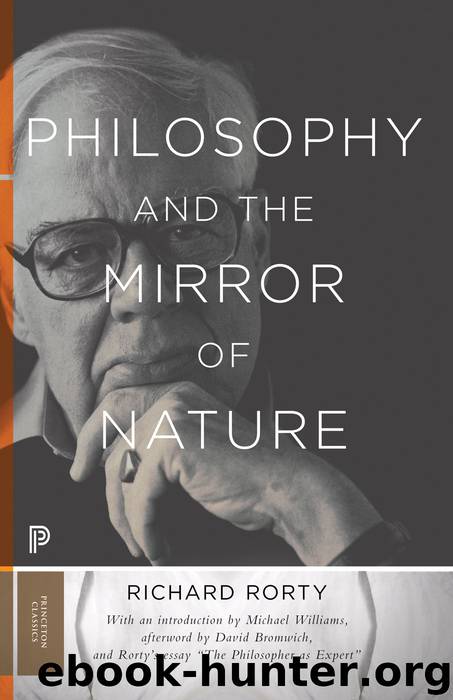Philosophy and the Mirror of Nature by Rorty Richard

Author:Rorty, Richard.
Language: eng
Format: epub
Publisher: Princeton University Press
Published: 2017-03-13T16:00:00+00:00
CHAPTER V
Epistemology and Empirical Psychology
1. SUSPICIONS ABOUT PSYCHOLOGY
The line of thought I have called “epistemological behaviorism” has produced a prejudice against the notion of “mental entities” and “psychological processes.” A certain picture of man’s higher faculties, common to Descartes and Locke, has been gradually erased by the work of such writers as Dewey, Ryle, Austin, Wittgenstein, Sellars, and Quine. However, this picture—the one which gave rise to the seventeenth-century notion of a “veil of ideas,” and thus to epistemological skepticism—has not been replaced by a new and clearer picture. On the contrary, there is widespread fratricidal disagreement among anti-Cartesians about what, if anything, to say about the mind. Ryle’s magic word “disposition” is no longer in favor, but more up-to-date notions such as “functional state” are offered as substitutes. Anything smacking of either Skinnerian methodological behaviorism or Rylean “logical” behaviorism is looked at askance, but it is agreed that there must be some way of avoiding such reductive efforts without falling back into the sort of dualism which engendered the traditional “problems of modern philosophy.” The counter-intuitive consequences of behaviorism, reductively interpreted, are illustrated by Malcolm’s polemic against much recent work by psychologists:
Thus, it is the facts, the circumstances surrounding the behavior, that give it the property of expressing recognition. This property is not due to something that goes on inside.
It seems to me that if this point were understood by philosophers and psychologists, they would no longer have a motive for constructing theories and models for recognition, memory, thinking, problem solving, understanding, and other “cognitive processes.”1
If we follow out this line of thought, we can decide that the whole empirical science of psychology is based on a mistake, and that there is no middle ground for research between common-sensical explanations of behavior on the one hand and neurophysiology on the other. The notion that there is a middle ground for psychology to investigate will, in this view, be a product of Malcolm’s “myth of cognitive processes and structures”—what Ryle called “Descartes’ Myth.” Malcolm seems inclined to take the matter to this point, for example, in his description of the Chomskyan notion of an “internalized system of rules” as typical of the root mistake of the “traditional theory of Ideas,” viz.:
The assumption … that in speaking a person must be guided. There must be something at hand that shows him how to speak, how to put words together grammatically and with coherent sense…. What is being explained is knowledge—both knowing that and knowing how. The presence in him of the structure of the language or of its system of rules is supposed to account for this knowledge—to explain how he knows. (p. 389)
If we once see that “our understanding of human cognitive powers is not advanced by replacing the stimulus-response mythology with a mythology of inner guidance systems” (p. 392), Malcolm thinks, we shall not think that there are any explanations to be looked for in this area.
It is certainly true that the model of the mind which led Descartes
Download
This site does not store any files on its server. We only index and link to content provided by other sites. Please contact the content providers to delete copyright contents if any and email us, we'll remove relevant links or contents immediately.
| Anatomy | Bacteriology |
| Biochemistry | Biostatistics |
| Biotechnology | Cell Biology |
| Embryology | Epidemiology |
| Genetics | Histology |
| Immunology | Microbiology |
| Neuroanatomy | Nosology |
| Pathophysiology | Physiology |
| Virology |
Tuesdays with Morrie by Mitch Albom(4769)
Yoga Anatomy by Kaminoff Leslie(4358)
Science and Development of Muscle Hypertrophy by Brad Schoenfeld(4127)
Bodyweight Strength Training: 12 Weeks to Build Muscle and Burn Fat by Jay Cardiello(3961)
Introduction to Kinesiology by Shirl J. Hoffman(3765)
How Music Works by David Byrne(3259)
Sapiens and Homo Deus by Yuval Noah Harari(3065)
The Plant Paradox by Dr. Steven R. Gundry M.D(2611)
Churchill by Paul Johnson(2578)
Insomniac City by Bill Hayes(2545)
Coroner's Journal by Louis Cataldie(2476)
The Chimp Paradox by Peters Dr Steve(2383)
Hashimoto's Protocol by Izabella Wentz PharmD(2371)
The Universe Inside You by Brian Clegg(2129)
Don't Look Behind You by Lois Duncan(2124)
The Immune System Recovery Plan by Susan Blum(2057)
Endure by Alex Hutchinson(2019)
The Hot Zone by Richard Preston(2013)
Woman: An Intimate Geography by Natalie Angier(1933)
